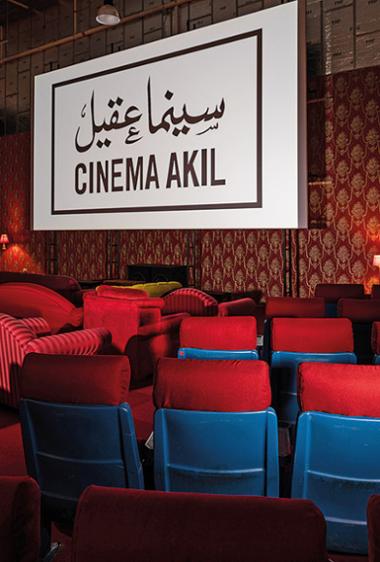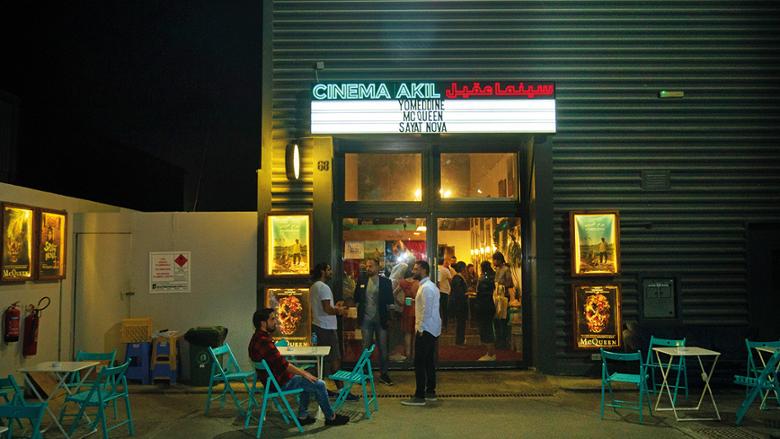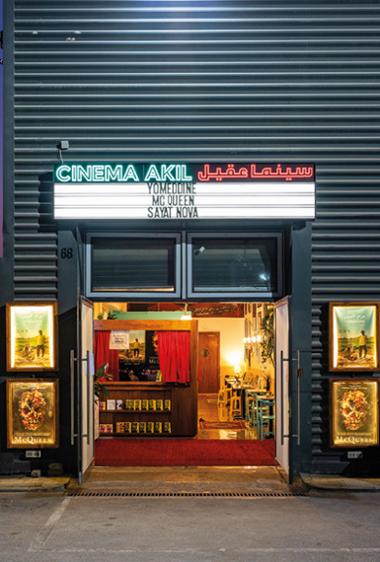Cinema Akil: How Dubai’s only arthouse cinema came to be
Butheina Kazim, founder of Cinema Akil, talks to Esha Nag about the joys of creating the only independent arthouse cinema in the region
I meet Butheina Kazim in the dimly lit, rose-red interiors of the very romantic Cinema Akil in Al Serkal Avenue. Kazim has had a busy start to the year. She’s been on the festival circuit — the Sundance in Utah, the Berlinale in Germany, the European Film Market and a host of other arthouse events — and seems happy to be back where her heart is. Her gorgeous silhouette complements the dark red-and-gold wallpaper of the warehouse that houses Cinema Akil, the only arthouse cinema in the region. It has shaped up beautifully since its opening in 2014 and has now earned her a steady flow of cinephiles who queue up to watch the seven and nine o’ clock shows every weekday evening. I see a good mix on offer: There’s Faces Places, a French documentary being screened, the cult classic The Rocky Horror Picture Show and Arabic drama Wajib. Everything about the 133-seater cinema sparks a nostalgia about the theatres of the 70s and 80s, a place of magic, of that willing suspension of disbelief we indulged in as we grew up and maybe even now.
‘Everyone has family and everyone has cinema,’ she tells me. ‘Whether you choose them or not, they come into your life, and change the way you see the world,’ she says as we sit down for a free-wheeling chat on what it takes to step off the conventional approach to business and let your passion guide you.
For Butheina that passion is cinema and it is evident in the space she has created. From the cool art deco posters that adorn the corridors leading to the theatre, the blue-bordered red vinyl seats she has retrieved from the Plaza (later Golden) cinema of Bur Dubai (the oldest single-screen standalone cinema in Dubai that was taken down to make way for a hotel), she hopes to create a sense of wonder and awe that single screen cinemas of yore had.
Cinematic offerings were pretty much limited in Dubai in the 80s and 90s when she was growing up. ‘They were limited to standalone cinemas and maybe a few independent family-owned ones. Not the multiplex kind of set-ups we are used to now. I remember going with my family to the Al Nasr Cinema, to the Plaza, and later to the Golden cinema. We had the 35mm projections, and cinema reels were carried as hand luggage. Also we only had mainstream Bollywood and Hollywood cinema and Arab cinema meant Egyptian cinema,’ says Butheina. But she remembers the whole experience as very communal, as a journey that family and friends undertook to experience something out of the ordinary. ‘The films would have a long run, you know, maybe for almost a month. And we would literally travel with our family and friends and visit the theatres, sometimes lingering around the neighbourhood with chai and snacks, enjoying the whole ambience of cinema going. At home we saw whatever we got our hands on. Cinema was very diverse, not didactic in any way.’

It was this ethos of community cinema that Butheina had in mind when she planned to start Cinema Akil. The cinema was a site of shared cultural experience or enjoyment for her, almost similar to museums or opera houses. ‘At present the multiplex experience is the dominant experience. It’s a grab-and-go thing, a matter of quick churn with a conveyor belt feeling. For me cinema is more about the ‘being together’ with other people, sharing and discussing what we see on screen.’
With a lot of standalone cinemas gone from Dubai’s social scene, Butheina wanted a space where one could enjoy a film in a relaxed manner and stay on and discuss it much after the credits rolled and the curtains fell. ‘I was also increasingly feeling that in a fast-growing culturally diverse city like Dubai, we needed more than commercial Bollywood or Hollywood cinema. That couldn’t be the only lingua franca of Dubai. There were other regional and independent international films that had the power to connect people. So we wanted a space that would bring people together and screen films that reflected the communities they came from — we wanted to talk about diversity.’
Butheina went to school and college in Dubai and then overseas, first to Toronto to study design and later to the New York University on a Fulbright scholarship to study media, culture and communications from 2011 and 2013. Before moving to New York, she had already produced a short but much acclaimed documentary, Letters to Palestine, which won her the special jury prize at the 2010 Abu Dhabi Film Festival. ‘I was also doing a lot of independent film screenings at the Pavilion in Downtown Dubai, or at the Shelter in my personal capacity and I could gauge the interest of people in these works pretty early on.’
It was in New York that Butheina worked with film historians, delving more deeply into world cinema. And it became all the more critical for her to have an avenue for independent films back home. ‘I came back and wanted to do something independently. I wanted a space or an environment where such films could be screened, something like a gallery or an exhibition space.’
Her first pop up of screenings happened in 2014 under the name of Cinema Akil. ‘Akil is an old Arabic name. It comes from the Arabic word Akal, meaning the brain or the mind. We almost personified cinema as that wise and intelligent person who would walk in through that door, possessing wisdom and knowledge.’ The pop up happened at the Third Line Gallery on Al Quoz. ‘We took over the gallery for six weeks and screened one film every week. It was on a very rough, low-budget setting with bean bags and crisps and we paired art films with more popular ones. So we had Satyajit Ray’s Pather Panchali, Hitchcock’s Dial M for Murder and also screened the works of Sophia Al Maria, Khalil Joreige and Fouad El Khoury. It was the middle of summer but to our surprise people turned up. It was a great way to realise that people were thirsty for such films. Our marketing was also very grassroots, it was mainly word of mouth, a bit of social media and through The Third Line mailing list.’

The success of the first pop up gave Kazim the push to do more pop ups from 2015-17 in different places in the UAE. ‘The pop ups were mostly art house films and we tried different settings, such as cinema under the stars during the outdoor season,’ she says.
It was around this time that the Al Serkal Avenue was growing and the galleries and communities it housed made it the logical choice for such films to be screened. ‘We knew this would be it. We didn’t want to have a space in a mall. We wanted some respite from the bright lights with a relaxed space like this. So up until 2017 the screenings were free, and it was for the first time in 2018 that we tested the viability of a box-office driven cinema from our space in Al Serkal. From 15 July to 30 September we sold tickets for Dh35 and then decided to push full steam ahead.’
Building a theatre in a warehouse was, however, a challenging proposition. “We tried and tested two other warehouses before we settled in for the final one, consulted four architects and three contractors. There were financial challenges… and getting the right permits to build a cinema inside a warehouse was difficult. This was not something that had been done. We were trying to build something that did not exist. But I am glad we set the precedent and I am proud of it.’ Butheina talks fondly of how seats of Cinema Akil were sourced from the Golden cinema in Bur Dubai before they demolished it. ‘I wanted to save a piece of history. The Golden Cinema building was stunning and it was sad to see it being pulled down.’
The beta version of Cinema Akil was worked on by multidisciplinary artists: Iraqi-Canadian Cheb Moha and Chndy from Oman. ‘We worked with a homegrown collective on designing what a cinema space would look like, but what remains from the beta version is just the red and gold wallpaper that we sourced from an Ethiopian supplier.’
Contrary to the usual theatres, Cinema Akil retains a flatness and does not have stadium seating. ‘We wanted it to be multipurpose so that we can move the seats around and turn it into a different space if needed. Our equipment is, however, top notch, same as the ones you find in the multiplexes, and we made sure of perfect acoustic treatments and top-grade projectors. It’s a Dolby sound custom-built cinema space so we didn’t compromise on the whole experience of watching film in any way.’

Butheina along with a co-programmer curates the film screenings herself. ‘We have lot of considerations, such as awards, subject matter and cultural sensibilities. Regional cinema is a key pillar. But at the same time we are not just focused on Arab films. Dubai is not just an Arab city. It is culturally closer to certain cities in South Asia than it is to Lebanon or Syria, so we want the programming to reflect that. We also try and work with local filmmakers and try and give them a platform. But we need more homegrown talent. It’s expensive to live in Dubai and work on films.”
So now that the lights are on, and the feedback has been more than assuring, how does it feel? ‘Oh it’s such a relief,’ says the 34-year-old Butheina. ‘We were always there but now we have finally opened doors. The dim lights and the red room evoke a bygone era but the technology is new and the food is comforting. We don’t promise a Gary Rhodes-like afternoon tea and film experience, it’s very chilled with the chai, salads and wraps.’ That explains the presence of Project Chaiwala, I say.
‘We are fine-tuning constantly, but this place is built on depth. We are committed to the community,’ she adds.
The pop ups will carry on, Butheina promises. “We will continue our screenings at the New York University in Abu Dhabi, at Saadiyat Island, at Warehouse 41… public programming will be in full swing. After all we cannot have people always coming to us, we have to go to them.’